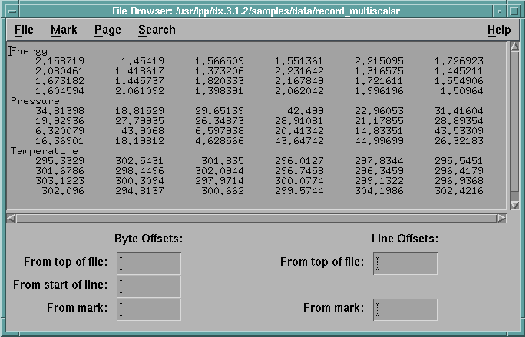
The Browser is a file-viewing tool to help you determine details of the layout and organization of a data file. Specifically, the Browser can measure offsets from a particular point (the top of a file, the beginning of a line, or a marker) and display the results in bytes and lines. These results can be copied and pasted (with standard Motif Copy/Paste operations) into the appropriate sections of the Data Prompter.
To browse a particular file:
You can enter a name directly in the field or click on the ellipsis button (...) to the right and select a name from the File Selection Dialog... box.
Figure 18. File Browser
Window. This window has just been opened and the cursor has not been
moved from its initial position at the beginning of the file. No numbers will
appear in the offset fields until the cursor is moved. The file displayed in the
window is /usr/lpp/dx/samples/data/record_multiscalar (see Example 1 of
"Record Style: Multivariable Data").

The single command in this menu is Close, which removes the Browser from the screen.
The commands in this menu control the placement of a "mark" in the selected file. The numbers displayed in the offset area are useful in specifying offset values for header (see Header), layout (see Layout), and block (see Block) in the Data Prompter.
Place mark | Replaces the character to the right of the cursor with a solid diamond-shaped mark. It will remain in place until moved to another position (with a new Place Mark command) or removed altogether. Note that the Browser allows only one mark at any time. |
Clear mark | Removes a mark from the file. |
Goto mark | Causes the Browser to display the text associated with a mark (if it is not already displayed in the file window). |
The two commands in this menu position the Browser at the beginning of the selected file (First page) or at the end of the file (Last page).
The single command in this menu is Search..., which displays a search dialog box. Any string or regular expression can be entered in the Search for field. The search begins at the current position of the cursor and proceeds forward (the Find Next button) or back (the Find Previous button). Searches "wrap around" in either direction. The Close button closes the dialog box.
The File Browser window displays the contents of the file being browsed. The cursor can be positioned anywhere in the text (with the left mouse button). When the cursor is repositioned, the values in the offset area below the file window are updated.
Five text fields at the bottom of the Browser display the "offsets" (in bytes and lines) from the top of the file or from a "mark" to the current position of the cursor. When the cursor is repositioned, the offset values are updated.
The text fields can be used to reposition the cursor anywhere in the file: enter a new value in a text field and press the Enter key. The cursor moves to the position specified by the new offset.
[Data Explorer Home Page | Contact Data Explorer | Same document on Data Explorer Home Page ]